前言
问:fd 为什么默认从 3 开始,而不是从 0,1,2?
💬 前面还存在默认标准文件,stdin, stdout, stderr ,和 0,1,2一一对应
验证:
#include <stdio.h>
#include <sys/types.h>
#include <sys/stat.h>
#include <fcntl.h>
#include <unistd.h>
#include <string.h>
int main(void)
{
int fd = open("log.txt", O_WRONLY | O_CREAT | O_TRUNC, 0666);
if (fd < 0) {
perror("open");
return 1;
}
printf("fd: %d\n", fd);
close(fd);
}
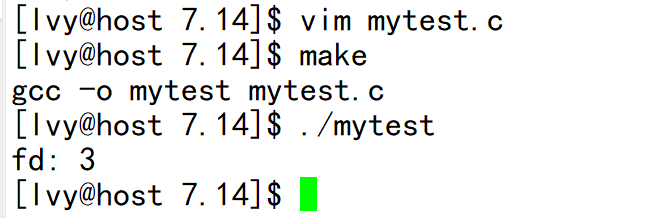
1.文件描述符分配规则
❗ 从 0 下标开始,寻找最小的没有使用的数组位置,它的下标就是新文件的文件描述符
(1) 关闭0,对返回的 fd 进行测试
int main(void)
{
close(0);
int fd = open("log.txt", O_WRONLY | O_CREAT | O_TRUNC, 0666);
if (fd < 0) {
perror("open");
return 1;
}
printf("fd: %d\n", fd);
close(fd);
}
运行:

(2)关闭 1
#include<stdio.h>
#include<string.h>
#include<sys/types.h>
#include<sys/stat.h>
#include<fcntl.h>
#include<unistd.h>
#include<stdlib.h>
int main()
{
// close(0);
// close(2);
close(1);
umask(0);
int fd=open("log.txt",O_WRONLY|O_CREAT|O_TRUNC,0666);
if(fd == -1)
{
perror("open");
exit(1);
}
printf("fd:%d\n",fd);
//这里必须刷新一下,不然log.txt里面没有内容,这里和缓冲区有关,下面讲
fflush(stdout);
close(fd);
return 0;
}
运行;

❓ 本来应该直接打到显示器上的消息,打印到了 log.txt 上,是为什么呢?
A: 进程不 care 1 文件发生的变化,先关闭再 open,根据验证规则,会实现对 1 文件的补充重定向
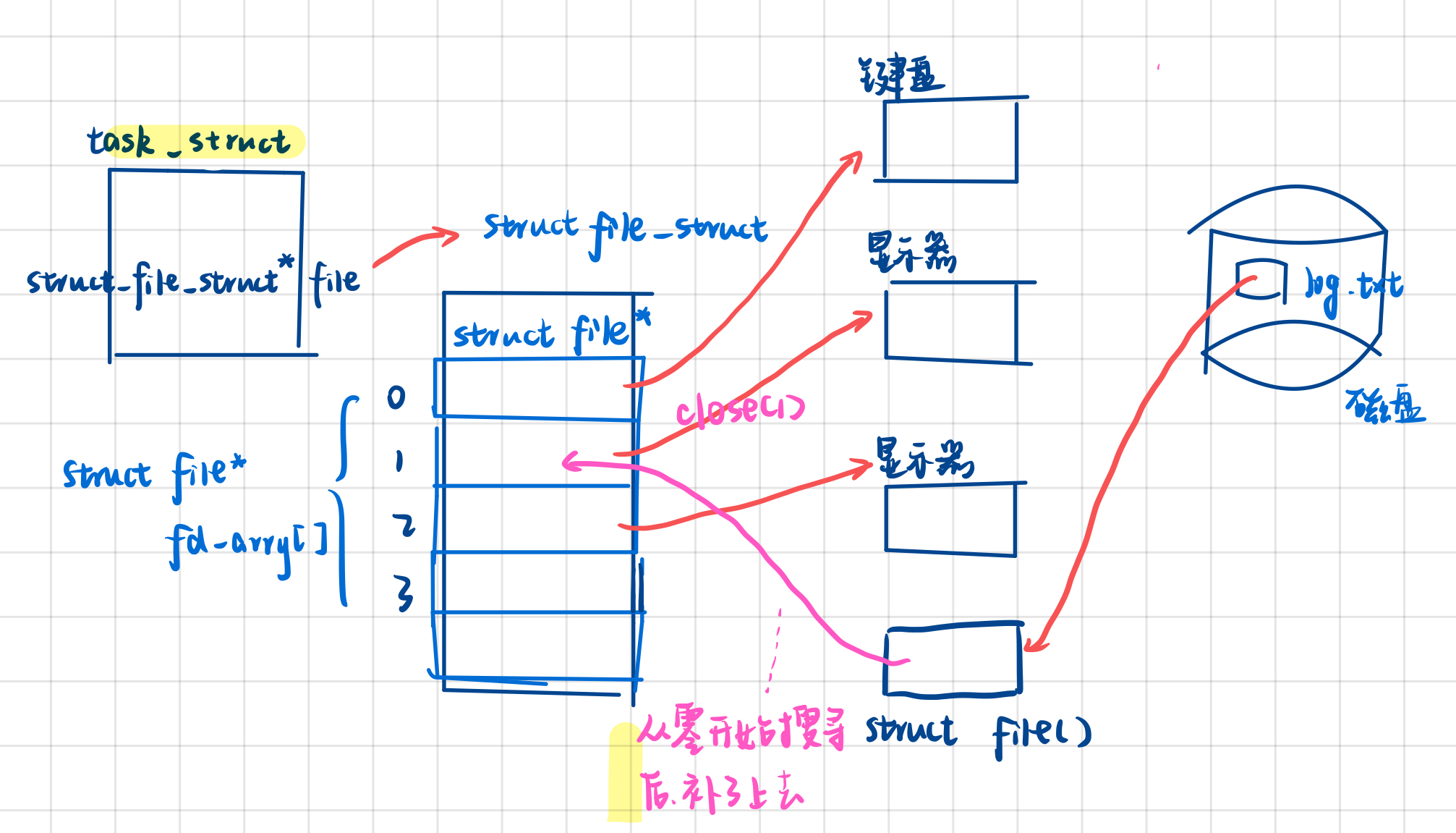
❗ 重定向的本质:上层用的 fd 不变,在内核中更改 fd 对应的 struct file* 地址
2.dup2 重定向接口
man dup2
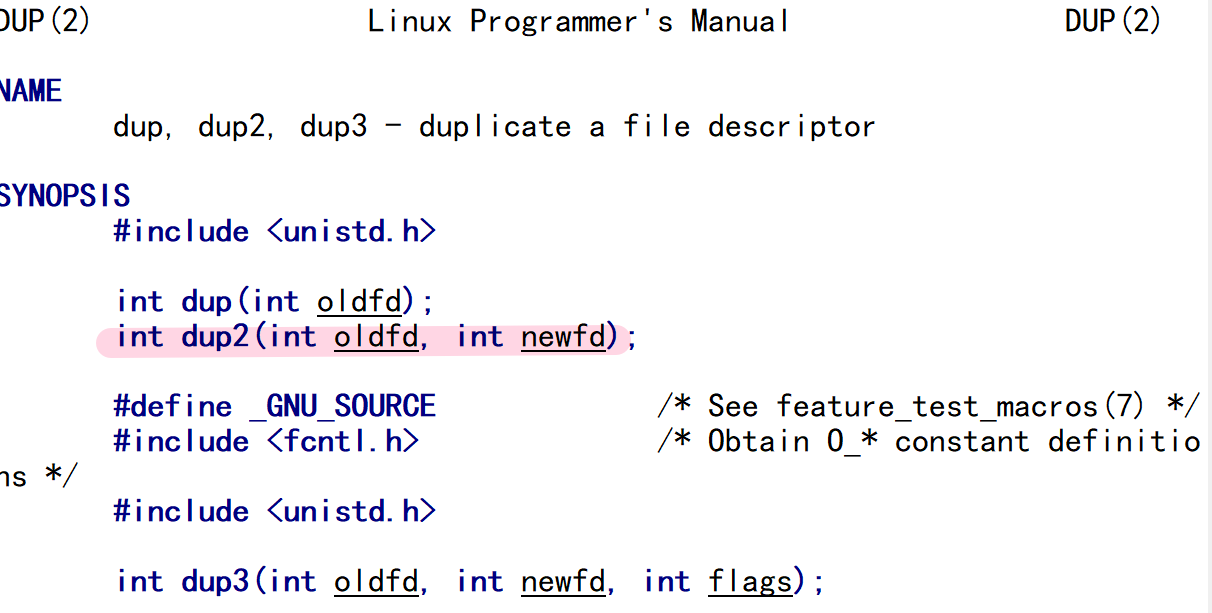
NAME 中提到:dup 复制文件描述符
函数功能:
dup2函数将文件描述符oldfd复制到newfd,并返回一个新的文件描述符。如果newfd已经打开,则将先关闭它。新的文件描述符将继承oldfd的文件状态标志(例如,文件偏移量、文件访问模式等)。函数返回值:
- 成功时,返回新的文件描述符;失败时,返回-1,并设置errno变量来指示错误类型。

具体应用: new be old ,新的被老的覆盖,所以保留的是 old,dup2(old, new),所以前一个文件会拷贝形成 double 份,如果想实现对之前操作的实现,即 dup2(fd,1)
tip: 拷贝的是下标指针 struct 的 拷贝替换
#include<sys/stat.h>
#include<fcntl.h>
#include<unistd.h>
#include<stdlib.h>
int main()
{
// close(0);
// close(2);
// close(1);
umask(0);
int fd=open("log.txt",O_WRONLY|O_CREAT|O_TRUNC,0666);
if(fd == -1)
{
perror("open");
exit(1);
}
//重定向
dup2(fd,1);
printf("fd:%d\n",fd);
//这里必须刷新一下,不然log.txt里面没有内容
fflush(stdout);
close(fd);
return 0;
}
运行:

fd 覆盖了 log,应该输出到 1 中的,就到 fd 文件里面了
3.重定向
3.1>输出重定向
上面内容就是输出重定向,把新打开文件的fd重定向到fd为1(默认为显示器)的位置。
3.2>>追加重定向
实现在文件原内容后面的添加
#include<stdio.h>
#include<string.h>
#include<sys/types.h>
#include<sys/stat.h>
#include<fcntl.h>
#include<unistd.h>
#include<stdlib.h>
int main()
{
// close(0);
// close(2);
// close(1);
umask(0);
// int fd=open("log.txt",O_WRONLY|O_CREAT|O_TRUNC,0666);
int fd=open("log.txt",O_WRONLY|O_CREAT|O_APPEND,0666);
if(fd == -1)
{
perror("open");
exit(1);
}
//重定向
dup2(fd,1);
printf("add hello\n");
//这里必须刷新一下,不然log.txt里面没有内容
fflush(stdout);
close(fd);
return 0;
}

3.3<输入重定向
测试:
#include<stdio.h>
#include<string.h>
#include<sys/types.h>
#include<sys/stat.h>
#include<fcntl.h>
#include<unistd.h>
#include<stdlib.h>
int main()
{
// close(0);
// close(2);
// close(1);
umask(0);
// int fd=open("log.txt",O_WRONLY|O_CREAT|O_TRUNC,0666);
// int fd=open("log.txt",O_WRONLY|O_CREAT|O_APPEND,0666);
int fd=open("log.txt",O_RDONLY);
if(fd == -1)
{
perror("open");
exit(1);
}
//输入重定向
dup2(fd,0);
char outbuffer[64];
while(1)
{
printf("<");
if(fgets(outbuffer,sizeof(outbuffer),stdin) == NULL) break;
printf("%s",outbuffer);
}
return 0;
}
输入重定向:
- 使用
**dup2(fd, 0)**将文件描述符**fd**重定向到标准输入(文件描述符0),即从此程序的标准输入将从**log.txt**读取。
读取并输出内容:
- 声明一个字符数组
**outbuffer[64]**用于存储从标准输入读取的内容。- 使用
**while**循环不断读取标准输入(现在是**log.txt**的内容)直到文件结束。**printf("<")**打印一个提示符。**fgets(outbuffer, sizeof(outbuffer), stdin)**从标准输入读取一行,如果读取失败(例如文件结束),则退出循环。**printf("%s", outbuffer)**将读取的内容打印到标准输出。
❗ fgets(stdin)的显示,由键盘变为了从文件中读取,后并打印
C++联动:
输入(将内容添加到文件之中),<读取(由从键盘读取变为了从某文件读取 fgets 0->fgets file)
3.4 shell 模拟实现< >
思路:
头文件
#include <stdio.h>
#include <stdlib.h>
#include <string.h>
#include <unistd.h>
#include <fcntl.h>
#include <sys/wait.h>
#include <assert.h>
#include <ctype.h>
// 定义重定向类型
#define NONE 0
#define IN_RDIR 1
#define OUT_RDIR 2
#define APPEND_RDIR 3
#define LEFT "<"
#define RIGHT ">"
#define LABLE "$"
// 全局变量用于重定向
char *rdirfilename;
int rdir = NONE;
int lastcode;
int quit = 0;
char commandline[1024];
// 函数声明
void getpwd();
char* getusername();
char* gethostname1();
void check_redir(char *cmd);
void interact(char *cline, int size);
void NormalExcute(char *_argv[]);
- check_redir:
- 该函数处理命令字符串以识别和处理输入(
**<**)、输出(**>**)和追加(**>>**)重定向。它更新命令字符串以排除重定向部分,并相应地设置全局变量**rdirfilename**和**rdir**。
// 检查并处理命令中的重定向
void check_redir(char *cmd) {
char *pos = cmd;
while (*pos) {//遍历pos
if (*pos == '>') {//查找重定向符号,对之后实现替换
if (*(pos + 1) == '>') {//追加重定向
*pos++ = '\0';
*pos++ = '\0';//切换字符并跳过
while (isspace(*pos)) pos++;//后面的判断怎么理解呢
rdirfilename = pos;//将文件名赋给
rdir = APPEND_RDIR;//命令行操作
break;
} else {
*pos = '\0';
pos++;
while (isspace(*pos)) pos++;
rdirfilename = pos;
rdir = OUT_RDIR;
break;
}
} else if (*pos == '<') {
*pos = '\0'; // ls -a -l -n < filename.txt
pos++;
while (isspace(*pos)) pos++;
rdirfilename = pos;
rdir = IN_RDIR;
break;
}
pos++;
}
}
- interact:
- 该函数提示用户输入,获取命令行,并调用
**check_redir**处理任何重定向。
- 该函数提示用户输入,获取命令行,并调用
void interact(char *cline, int size) {
getpwd();//获取当前工作目录并打印提示符
printf(LEFT"%s@%s %s"RIGHT""LABLE" ", getusername(), gethostname1(), pwd);
char *s = fgets(cline, size, stdin);//获取命令行输入
assert(s);
(void)s;
cline[strlen(cline) - 1] = '\0';//移除换行符
check_redir(cline);//处理重定向符号
}
- NormalExcute:
- 该函数创建一个新进程来执行给定的命令。如果设置了任何重定向,它会在执行命令之前相应地调整文件描述符。
// Function to execute commands
void NormalExcute(char *_argv[]) {
pid_t id = fork();
if (id < 0) {
perror("fork");
return;
} else if (id == 0) {
int fd = 0;
if (rdir == IN_RDIR) {//对标记的rdir进行操作判断
fd = open(rdirfilename, O_RDONLY);
dup2(fd, 0);
} else if (rdir == OUT_RDIR) {
fd = open(rdirfilename, O_CREAT | O_WRONLY | O_TRUNC, 0666);
dup2(fd, 1);
} else if (rdir == APPEND_RDIR) {
fd = open(rdirfilename, O_CREAT | O_WRONLY | O_APPEND, 0666);
//打开操作的mode设置
dup2(fd, 1);//对文件进行重定向
}
execvp(_argv[0], _argv);
exit(EXIT_FAILURE);
} else {
int status = 0;
pid_t rid = waitpid(id, &status, 0);
if (rid == id) {
lastcode = WEXITSTATUS(status);
}
}
}
- main:
- 程序的主循环初始化重定向设置,与用户交互以获取命令,将命令行输入分割成参数,并调用
**NormalExcute**执行命令。
- 程序的主循环初始化重定向设置,与用户交互以获取命令,将命令行输入分割成参数,并调用
int main() {
while (!quit) {
rdirfilename = NULL;
rdir = NONE;
interact(commandline, sizeof(commandline));
// Tokenize the command line input into arguments
char *argv[64];
int argc = 0;
char *token = strtok(commandline, " ");
while (token != NULL) {
argv[argc++] = token;
token = strtok(NULL, " ");
}
argv[argc] = NULL;
if (argc > 0) {
NormalExcute(argv);
}
}
return 0;
}
- 占位符函数:
**getpwd**、**getusername**和**gethostname1**是用于获取当前工作目录、用户名和主机名的占位符函数,应根据需要实现实际功能。
void getpwd() {
// Implement function to get current working directory
}
char* getusername() {
// Implement function to get the username
return "user";
}
char* gethostname1() {
// Implement function to get the hostname
return "hostname";
}
运行:

思考:
问:后面我们做了重定向的工作,后面我们在进行程序替换的时候,难道不影响吗???
不影响
❗ 程序替换,和文件访问是并列的关系,mm_struct && file_struct ,程序替换,只会替换代码和数据,不影响曾经打开的重定向文件
联系:可以通过对文件调动,为进程替换提供良好的环境
问:子进程重定向会影响父进程吗?
不会
❗ 子进程会对父进程进行写实拷贝
3.5 理解>
#include <stdio.h>
#include <unistd.h>
#include <sys/types.h>
#include <sys/stat.h>
#include <fcntl.h>
#include <string.h>
#define filename "log.txt"
int main()
{
fprintf(stdout, "hello normal message\n");
fprintf(stdout, "hello normal message\n");
fprintf(stdout, "hello normal message\n");
fprintf(stdout, "hello normal message\n");
fprintf(stdout, "hello normal message\n");
fprintf(stderr, "hello error message\n");
fprintf(stderr, "hello error message\n");
fprintf(stderr, "hello error message\n");
fprintf(stderr, "hello error message\n");
fprintf(stderr, "hello error message\n");
测试:
./mytest 1>nomal.log 2>err.log
//合并
./mytest 1>all.log 2>&1 //实现了覆盖
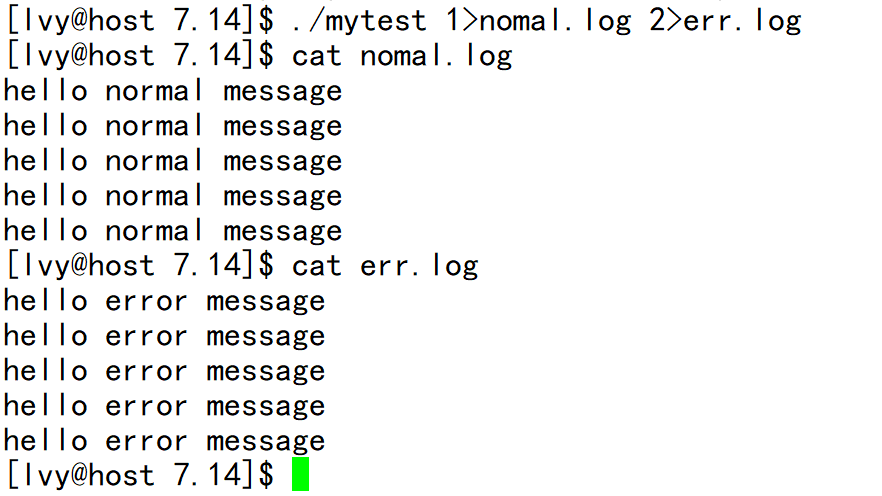
默认指向的是 1,那 2 的设置有什么意义呢?
意义: 将错误信息和正确信息分开放了,便于程序员的查看
❗ 对于重定向的记忆
cat(cout)<<输出
(cin)输入到
和原理毫不相关,就是用着发现这样挺好记忆的
4. 理解“Linux 下一切皆文件”
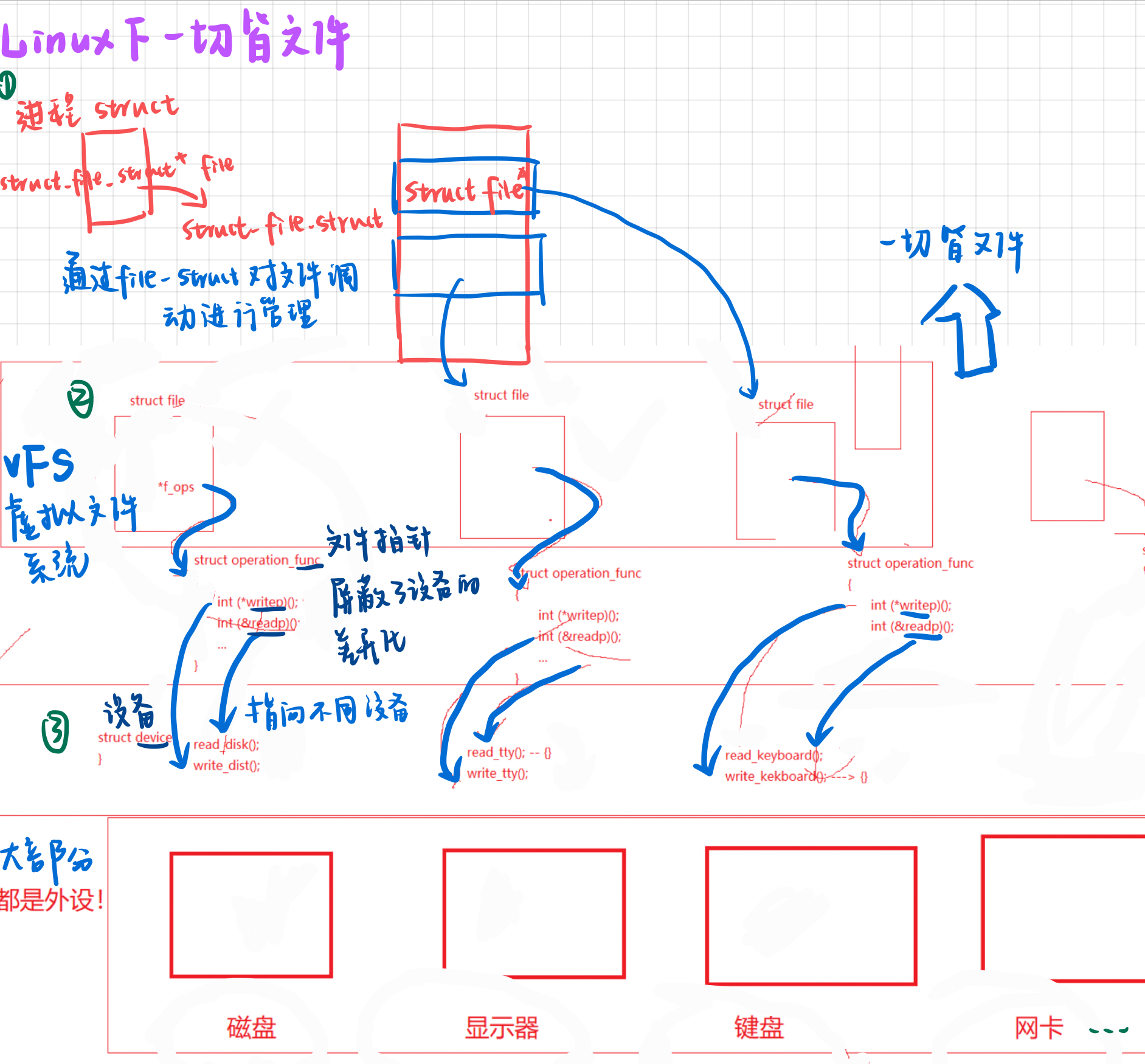
🔔 进程通过对文件的管理实现了对设备的管理,设备的信息其实也是以文件的形式存储了
这里可能有这样一个问题,如果同一个文件被多个指针指向,但是某个进程把这个文件关了,会不会影响其他进程对这个文件的操作呢?
A: 其实并不会,一个被打开的文件有引用计数。
表明有几个指针指向这个文件,这样做是因为一个文件可能被多个指针指向。如果某个进程关闭文件,影响到其他进程,就不能保证进程的独立性。close关闭文件,其实并不是真正关闭文件,只是把引用计数减1,当只有一个指针指向这个文件,close关闭文件才是真正关闭这个文件。
文件有*write file 指针,屏蔽掉了设备的差异化,通过指针指向//C++联想:多态,奇类,派生类
思考:
面向对象,是历史的必然,是先进的表现
万变不离其宗:
学习了底层知识,就可以是我们面对各种语言进行文件读取时,读读文档,就能上手操作了
学习思考:通过不断的实验和提问,来进行学习
版权归原作者 lvy¯ 所有, 如有侵权,请联系我们删除。